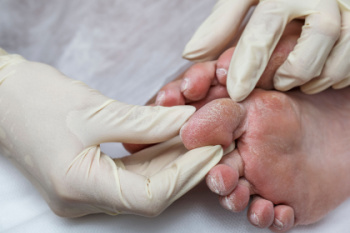Items filtered by date: June 2025
Listening to Children About Their Footwear Choices

Children have clear opinions about the shoes they wear, and their feedback offers important insight. While adults may focus on fit or durability, children often base their choices on how shoes feel during play, how easy they are to put on, or even how they look to peers. Comfort is often described in ways that reflect movement, whether shoes feel tight, squishy, or too hard. When kids resist wearing certain shoes, it may not just be about style. It could signal that the shoes feel restrictive, awkward, or even painful. Engaging with children about what they notice helps caregivers and providers make better choices that support growing feet without causing frustration or discomfort. The right shoes can promote healthy development and make activity more enjoyable. If a child regularly avoids wearing shoes or complains of foot discomfort, it is suggested that you schedule an appointment with a podiatrist for a diagnosis and appropriate treatment.
The health of a child’s feet is vital to their overall well-being. If you have any questions regarding foot health, contact Larry J. Kipp, DPM of Coastal Podiatry Center. Our doctor can provide the care you need to keep you pain-free and on your feet.
Tips for Keeping Children's Feet Healthy
- Make sure their shoes fit properly
- Look for any signs of in-toeing or out-toeing
- Check to see if they have Clubfoot (condition that affects your child’s foot and ankle, twisting the heel and toes inward) which is one of the most common nonmajor birth defects.
- Lightly cover your baby’s feet (Tight covers may keep your baby from moving their feet freely, and could prevent normal development)
- Allow your toddler to go shoeless (Shoes can be restricting for a young child’s foot)
- Cut toenails straight across to avoid ingrown toenails
- Keep your child’s foot clean and dry
- Cover cuts and scrapes. Wash any scratches with soap and water and cover them with a bandage until they’ve healed.
If you have any questions, please feel free to contact our office located in New Port Richey, FL . We offer the newest diagnostic and treatment technologies for all your foot care needs.
Let the Expert Treat Your Ingrown Toenails
Protecting Your Feet When You Have Diabetes

Keeping feet in good condition is especially important for those people managing diabetes. The loss of sensation or reduced blood flow can make it harder to notice minor injuries, which can become serious, if ignored. A gentle wash each day using lukewarm water and a soft cloth can help keep the skin clean. Drying the feet carefully, particularly between the toes, lowers the risk of skin problems. Applying a plain, unscented cream to the heels and soles helps maintain softness, although the areas between the toes should be left dry. Shoes should be roomy and protective to limit friction and pressure. Inspecting the feet daily for changes in color, swelling, or signs of irritation helps catch issues early. If you notice something unusual or have a sore that is not healing, it is suggested that you see a podiatrist for evaluation and tailored care.
Diabetic foot care is important in preventing foot ailments such as ulcers. If you are suffering from diabetes or have any other concerns about your feet, contact Larry J. Kipp, DPM from Coastal Podiatry Center. Our doctor can provide the care you need to keep you pain-free and on your feet.
Diabetic Foot Care
Diabetes affects millions of people every year. The condition can damage blood vessels in many parts of the body, especially the feet. Because of this, taking care of your feet is essential if you have diabetes, and having a podiatrist help monitor your foot health is highly recommended.
The Importance of Caring for Your Feet
- Routinely inspect your feet for bruises or sores.
- Wear socks that fit your feet comfortably.
- Wear comfortable shoes that provide adequate support.
Patients with diabetes should have their doctor monitor their blood levels, as blood sugar levels play such a huge role in diabetic care. Monitoring these levels on a regular basis is highly advised.
It is always best to inform your healthcare professional of any concerns you may have regarding your feet, especially for diabetic patients. Early treatment and routine foot examinations are keys to maintaining proper health, especially because severe complications can arise if proper treatment is not applied.
If you have any questions please feel free to contact our office located in New Port Richey, FL . We offer the newest diagnostic and treatment technologies for all your foot and ankle needs.
When a Child’s Toe Changes Shape

Hammertoe is a condition where one or more toes bend downward at the middle joint, creating a claw-like appearance. While more common in adults, it can also develop in children, often due to muscle imbalance, flat feet, or wearing shoes that are too tight. In growing feet, this abnormal bending may become more noticeable over time and can lead to rubbing, discomfort, or difficulty finding comfortable shoes. Early signs may include redness on top of the toe, or the child avoiding certain shoes or activities. In many cases, flexible hammer toes in children, where the toe can still be straightened manually. This indicates that the joint has not become rigid or fixed and can be managed with proper footwear, stretching exercises, and custom inserts to help guide foot alignment. If the toe becomes stiff or painful, further care may be needed. In this case, it is suggested that you visit a podiatrist who can evaluate your child’s foot development and recommend the right treatment.
Hammertoe
Hammertoes can be a painful condition to live with. For more information, contact Larry J. Kipp, DPM from Coastal Podiatry Center. Our doctor will answer any of your foot- and ankle-related questions.
Hammertoe is a foot deformity that affects the joints of the second, third, fourth, or fifth toes of your feet. It is a painful foot condition in which these toes curl and arch up, which can often lead to pain when wearing footwear.
Symptoms
- Pain in the affected toes
- Development of corns or calluses due to friction
- Inflammation
- Redness
- Contracture of the toes
Causes
Genetics – People who are genetically predisposed to hammertoe are often more susceptible
Arthritis – Because arthritis affects the joints in your toes, further deformities stemming from arthritis can occur
Trauma – Direct trauma to the toes could potentially lead to hammertoe
Ill-fitting shoes – Undue pressure on the front of the toes from ill-fitting shoes can potentially lead to the development of hammertoe
Treatment
Orthotics – Custom made inserts can be used to help relieve pressure placed on the toes and therefore relieve some of the pain associated with it
Medications – Oral medications such as anti-inflammatories or NSAIDs could be used to treat the pain and inflammation hammertoes causes. Injections of corticosteroids are also sometimes used
Surgery – In more severe cases where the hammertoes have become more rigid, foot surgery is a potential option
If you have any questions please contact our office located in New Port Richey, FL . We offer the newest diagnostic and treatment technologies for all your foot and ankle needs.
Bunion Surgery May Be the Right Step for Long Term Relief

When bunion pain becomes a daily struggle and non-operative treatments no longer help, surgery may be the next option. Bunion surgery involves realigning the bones, ligaments, and tendons to restore the natural position of the big toe. There are several types of procedures, and the right one depends on the severity of the deformity and the patient’s activity level and goals. Recovery time varies, but most people can return to wearing regular shoes within a few months. With the right follow up care, surgery can reduce pain, improve foot function, and allow for greater freedom in footwear choices. If your bunions are limiting your lifestyle or causing constant discomfort, it is suggested that you see a podiatrist to discuss whether surgery is right for you.
Foot surgery is sometimes necessary to treat a foot ailment. To learn more, contact Larry J. Kipp, DPM of Coastal Podiatry Center. Our doctor will assist you with all of your foot and ankle needs.
When Is Surgery Necessary?
Foot and ankle surgery is generally reserved for cases in which less invasive, conservative procedures have failed to alleviate the problem. Some of the cases in which surgery may be necessary include:
- Removing foot deformities like bunions and bone spurs
- Severe arthritis that has caused bone issues
- Cosmetic reconstruction
What Types of Surgery Are There?
The type of surgery you receive will depend on the nature of the problem you have. Some of the possible surgeries include:
- Bunionectomy for painful bunions
- Surgical fusion for realignment of bones
- Neuropathy decompression surgery to treat nerve damage
Benefits of Surgery
Although surgery is usually a last resort, it can provide more complete pain relief compared to non-surgical methods and may allow you to finally resume full activity.
Surgical techniques have also become increasingly sophisticated. Techniques like endoscopic surgery allow for smaller incisions and faster recovery times.
If you have any questions please feel free to contact our office located in New Port Richey, FL . We offer the newest diagnostic and treatment technologies for all your foot and ankle needs.


